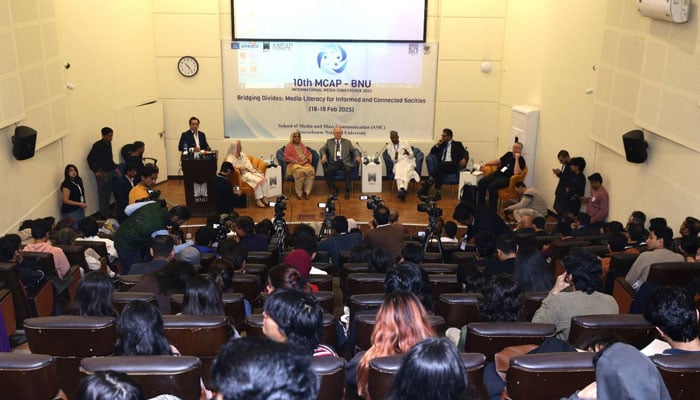Global media moot draws scholars from 10 countries
LAHORE:The 10th MCAP-BNU international media conference, organised by the Media and Communication Academic Professionals (MCAP), was inaugurated by Dr Moeed Yusuf, Vice Chancellor, BNU Lahore.
The global conference has brought together leading academics, journalists, policymakers, media professionals and scholars from 10 countries, including the United States, Germany, Russia, Czechia, Sweden, Nigeria, Qatar, Egypt, the UAE, and Pakistan, to examine the role of media literacy in building informed, interconnected and inclusive societies. While addressing the inaugural session, Dr Moeed Yusuf emphasised on correct use of information in all spheres of life.
He said, ‘The most important aspect is to focus on how information can be transformed into knowledge. Our focus should be on ensuring the excellence and brilliance in every field’.
The theme for this year is ‘Bridging Divides: Media Literacy for Informed and Connected Societies,’ and with it the conference aims to address the pressing need for critical media engagement in an age of misinformation, biased narratives, and digital manipulation. By providing participants with analytical tools and media literacy skills, the event seeks to strengthen social cohesion and encourage regional cooperation. The speaker line-up includes: Senator Mushahid Hussain Sayed, Zhao Shiren, Consul General of China in Lahore, Moeed Yusuf, VC-BNU, Prof Dr Umaru A Pate, VC Federal University Kashere, Nigeria, Prof Dr Lee Artz, Purdue University USA, Prof Dr Nico Carpentier, Professor, Charles University, among others. The two-day conference will explore critical issues shaping the future of media and communication, through Plenary Sessions on Regional Information Challenges – Examining how media literacy can enhance regional connectivity, with a focus on initiatives like the China-Pakistan Economic Corridor (CPEC); Critical engagement with entertainment media – discussing how media literacy can challenge harmful stereotypes and promote inclusive storytelling; Empowering communities through digital inclusion – emphasising equitable access to digital technologies and media literacy education.
-
 China: Stunning Drone Show Lights Up Night Sky Ahead Of Spring Festival 2026
China: Stunning Drone Show Lights Up Night Sky Ahead Of Spring Festival 2026 -
 Andrew's Epstein Scandal: Will King Charles Abdicate Following King Edward's Footsteps?
Andrew's Epstein Scandal: Will King Charles Abdicate Following King Edward's Footsteps? -
 Billy Joel Leaves Loved Ones Worried With His 'dangerous' Comeback
Billy Joel Leaves Loved Ones Worried With His 'dangerous' Comeback -
 Prince William Dodges Humiliating Question In Saudi Arabia
Prince William Dodges Humiliating Question In Saudi Arabia -
 Dax Shepard Describes 'peaceful' Feeling During Near-fatal Crash
Dax Shepard Describes 'peaceful' Feeling During Near-fatal Crash -
 Steve Martin Says THIS Film Has His Most Funny Scene
Steve Martin Says THIS Film Has His Most Funny Scene -
 Kensington Palace Shares Update As Prince William Continues Saudi Arabia Visit
Kensington Palace Shares Update As Prince William Continues Saudi Arabia Visit -
 Fugitive Crypto Scammer Jailed For 20 Years In $73m Global Fraud
Fugitive Crypto Scammer Jailed For 20 Years In $73m Global Fraud -
 Will Andrew Mountbatten-Windsor Finally Go To Jail Now That King Charles Has Spoken Out? Expert Answers
Will Andrew Mountbatten-Windsor Finally Go To Jail Now That King Charles Has Spoken Out? Expert Answers -
 Melissa McCarthy Reveals Her Tried And Tested ‘corpse’ Night Time Routine That’s Lost Her 95lbs
Melissa McCarthy Reveals Her Tried And Tested ‘corpse’ Night Time Routine That’s Lost Her 95lbs -
 Horrifying Pictures Of The Kidnapper Of Savannah Guthrie's Mother Released
Horrifying Pictures Of The Kidnapper Of Savannah Guthrie's Mother Released -
 Andrew's Ex-girlfriend Launches Brazen Attack On Epstein Victims On Piers Morgan Show
Andrew's Ex-girlfriend Launches Brazen Attack On Epstein Victims On Piers Morgan Show -
 Andrew Mountbatten-Windsor 'on His Own' As Palace Gives Green Light To Law Enforcement
Andrew Mountbatten-Windsor 'on His Own' As Palace Gives Green Light To Law Enforcement -
 Kanye West's Tweet About Super Bowl Halftime Resurfaced After Bad Bunny's Show
Kanye West's Tweet About Super Bowl Halftime Resurfaced After Bad Bunny's Show -
 'FBI' Star Juliana Aidén Martinez Tease Her Return To 'Law And Order: SVU' After Quitting
'FBI' Star Juliana Aidén Martinez Tease Her Return To 'Law And Order: SVU' After Quitting -
 Cardi B's Emotional Words To Pal Amid Stefon Diggs Rumored Breakup Revealed
Cardi B's Emotional Words To Pal Amid Stefon Diggs Rumored Breakup Revealed




